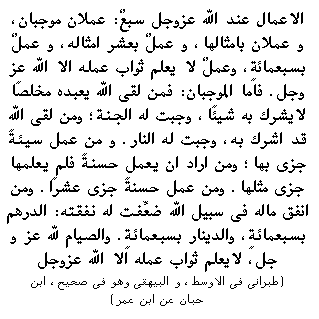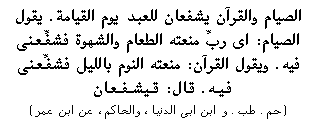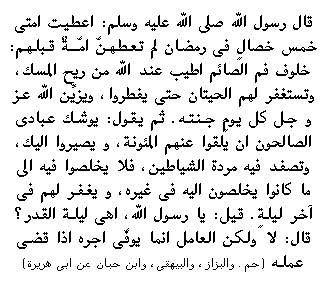Prof. Dr. Mahmud Es'ad COSAN
AKRA FM Friday Discourse
December 1, 2000
BEAUTIES OF RAMADAN
As-salâmu 'alaykum wa rahmatullàhi wa barakâtuhû!..
Dear Brothers and Sisters,
May you enjoy Ramadan. May Almighty Allah give you opportunities to benefit from the blessings of Ramadan in full. May He be pleased with you all. May He honor you and grant you happiness in this world and in the hereafter.
a. Rewards for Deeds
The first hadith for today's discourse was narrated by Abdullah Ibn-i Omar RA. It is recorded in Awsat of Tabarânî, Sahîh of Ibn-i Hibbân, and in the collection of Bayhakî. Let us read the original text of the hadith:

(Al-a'mâlu indallàhi 'azza wa jalla seb'un: 'Amalâni mûjibân, 'wa amalâni bi-emthâlihimâ, wa 'amalun bi'ashri emthâlihî, wa 'amalun biseb'imi-eh, wa 'amalun lâ ya'lemu thawâba àmilihî illallàhu ta-àlâ 'azza wa jalla.
Fa-ammal-mûjibân: Famen leqiyallàhu ya'buduhû mukhlisan lâ yushriku bihî shay'an, wajabat lahul-jannah. Wa men leqiyallàhu qad ashraka bihî, wajabat lehun-nâr. Wa men 'amila sayyi-eten juziya bihâ, wa men arâda an ya'mala hasanatan felem ya'malhâ juziya mithlahâ. Wa men 'amila hasanatan juziya ashran. Wa men anfaqa mâlehû fî sebîlillâhi du'ifet lehû nafaqatuhû: Ad-dirhamu biseb'imi-eh, wad-dînâri biseb'imi-eh.
Was-siyâmu lillâhi azza wa jalla, lâ ya'lamu thawâba àmilihî illallàhu azza wa jalla.) Sadaqa rasûlullàh, fî mâ qàl, aw kamâ qàl. (At-Targhîb, Fasting: 8)
Our beloved Prophet said:
(Al-a'mâlu indallàhi 'azza wa jalla seb'un) "In the sight of Allah, deeds are of seven kinds: ('Amalâni mûjibân) Two of them are of a requiring type. (Wa amalâni bi-emthâlihimâ) Two of the deeds are rewarded in equal, (wa 'amalun bi'ashri emthâlihî) and there is one deed which is rewarded in ten folds. (Wa 'amalun biseb'imi-eh) Another deed is rewarded in seven hundred folds, (wa 'amalun lâ ya'lemu thawâba àmilihî illallàhu ta-àlâ 'azza wa jalla) and there is last kind of deed that nobody but Allah knows how much reward will be given for.
The Prophet classified the deeds in this mysterious way to incur attention in the audience. I am sure you are also wondering what these deeds are. The explanation is given in the rest of the hadith:
(Fa-ammal-mûjibân) "Here are the requiring types: (Famen leqiyallàhu ya'buduhû mukhlisan lâ yushriku bihî shay'an) If a person reaches Allah in a state of sincere worship and not associating anything in His powers, (wajabat lahul-jannah) the Paradise will be a must for him." That means if a person worships Allah sincerely and does not commit shirk, he will enter Paradise. This is one of the two "requiring" kinds of deeds out of seven types.
May Allah keep us as sincere servants worshipping Him alone. May He save us from committing any kind of shirk because it is very important. If a person commits shirk, he will end up in Hell. Those who commit shirk will be deprived of forgiveness. This is clearly stated in the Qur'an.
Al hamdulillah, we are Muslims; we declare, "Lâ ilâha il-lal-lah, Muhammadur-rasulallah--There is no deity but Allah, and Muhammad is his Prophet." We do not attribute any partners with Allah; we worship Him alone.
There are groups of people in the word who worship the stars, the sun, the moon; some worship a mountain or nature. Praise to Allah, we have a pure faith, and we belong to people of Unity (tawheed). Allah willing, this century will be the century of Unity, and the shirk will be wiped out in the world.
The Prophet continued: (Wa men leqiyallàhu qad ashraka bihî) "If a person reaches Allah while he is in a state of shirk, (wajabat lehun-nâr) the Hellfire will be a must for him."
We need to explain the meaning of the words of the hadith so that it is well understood. Some people react when they see us practicing Islam or when we invite them to Islam: "I have a belief, too. I believe in God."
"Well, what do you believe in? Not all beliefs are acceptable."
"I believe in Allah."
"You have to believe in Allah the way Allah wants you to. Then one must do what his belief requires him to."
Some people claim that they believe in God, yet if you look at it carefully, you can see shirk in their beliefs. That is not acceptable.
If a person commits shirk and dies as mushrik even if he has a belief and a religion, he goes to Hell. Such a life requires Hell in the hereafter. This is the second type of deed that is of the requiring type.
The second group of deeds are as follows: (Wa men 'amila sayyi-eten juziya bihâ) "If a person commits a wrong deed, he will incur one punishment. (Wa men arâda an ya'mala hasanatan) If a person intends to do a good deed (felem ya'malhâ) yet fails to carry it out for some reason--he may not have any time, any power, any money or alike-- (juziya mithlahâ) he will be rewarded for that deed."
For instance, I sincerely want to have a mosque built with my own many without asking anybody else for contributions. Truly I want to do this, yet I could not do it. If I die, I will get the reward as though I had it built. There can be countless examples of such deeds.
Here is the fifth type of deed: (Wa men 'amila hasanatan) "If a person carries out a good deed such as a prayer, fasting, or something that is pleasing to Allah, (juziya ashran) He will be rewarded ten times." Such a person does not get only one reward; he gets ten times more rewards.
Here is the sixth type of deed: (Wa men anfaqa mâlehû fî sebîlillâhi) " If a person spends his money or property (fî sebîlillâh) in the way of Allah, (du'ifet lehû nafaqatuhû) the sustenance, the money or his property that he spends is increased in many folds: (Ad-dirhamu biseb'imi-eh) one dirham of his money will be rewarded as seven-hundred dirhams, (wad-dînâri biseb'imi-eh) his dinar will be rewarded as seven-hundred dinars." That is if he spends a cent, it will be rewarded as seven-hundred cents; if he spends a dollar, it will be rewarded as seven-hundred dollars.
What does spending fî sebîlillâh mean? As we infer from the ahadith of the Prophet, contribution to jihad is considered as fî sebîlillâh. It will be rewarded seven-hundred folds. Also, money spend on Hajj and umrah is considered as fî sebîlillâh.
Spending money on seeking knowledge is also considered as fî sebîlillâh. A person may send his child to some school to study and become a knowledgeable person. Or a person may attend a lecture by a scholar. All of the expenses will be rewarded seven hundred times.
b. Reward for Fasting
The seventh kind of deed is about fasting: (Was-siyâmu lillâhi azza wa jalla) "The fasting is for Almighty Allah and it belongs to Him." Verily all worship is carried out for Allah, but fasting is different. (Lâ ya'lamu thawâba àmilihî illallàhu azza wa jalla) "Nobody but Allah knows the reward of fasting."
This means that there will be countless rewards for fasting because fasting equals being patient. Rewards for being patient is countless as indicated in the Qur'an. We can infer that it is more than seven hundred times.
Dear Brothers and Sisters!
Since fasting is such a valuable form of worship, we must perfect it. As I explained it last week, a perfect fast is not a mere hunger and a thirst. A person must fast with his body as well as his spirit. All of his senses and organs must participate in fasting. His eyes shall not look at haram; his ears shall not hear haram. He shall not reach haram with his hand; he shall not go to haram with his feet. He must stay away from all kinds of wrongdoings.
In this blessed month of Ramadan, when I look at some broadcast on the television, I get very disappointed. Instead of helping Muslims enjoy Ramadan in peace and full of good deeds, they advocate entertainment and encourage people to do things that are in contradiction to the teaching of Islam.
Some televisions avoid religious programs, yet still bring up issues that will leave doubts in people's minds and underline the tenets of their beliefs. With their televisions, radios and newspapers, the forces of evil are in full operation to give Muslims a hard time in this Ramadan.
The solution for this problem is boycotting this kind of media all together. We must not buy their newspaper, nor must we watch their channels. That will work effectively to reduce their circulation and to teach them a lesson.
I remind you often that Almighty Allah will get angry at a person who shows some respect to a sinner. He should advise the sinner and try to prevent him from committing sin. Encouragement, applause and support are not proper treatment for such people.
c. Intercession of Fasting and Qur'an
The second hadith was, too, narrated y Abdullah Ibn-i Omar RA. It is in the collections of Ahmad Ibn-i Hanbal, Tabarânî, Abid-Dunyâ and Hâkim. It is an authentic hadith. The Prophet SAS said:

(As-siyâmu wal-Qur'ânu yashfe-àni lil-abdi yawmal-qiyâmah. Yaqùlus-siyâmu: Ey rabbi mena'tuhut-taàme wash-shahwata fashaffi'nî fîhi. Wa yaqùlul-Qur'ân: Mena'tuhun-nawma bil-layli fashaffi'nî fîh. Qàle: Fayashfe-àn.) Sadaqa rasûlullah, fî mâ qàl, aw kemâ qàl. (At-Targhîb, Fasting: 15)
(As-siyâmu wal-Qur'ânu yashfe-àni lil-abdi yawmal-qiyâmah) "Both fasting and the Qur'an will be intercessors on the day of Resurrection." On the that every body raises from dead, when the colossal court is established and the trials begin, the fasting and Qur'an will testify in favor of a person who fasted and recited Qur'an. (Yaqùlus-siyâmu) "The fasting will say, (Ey rabbi) 'My Lord! (mena'tuhut-taàme) I kept this servant of your away from food (wash-shahwata) and sexual desires. (Fashaffi'nî fîhi) Allow me to intercede in favor of this servant. Forgive him his sins.' (Wa yaqùlul-Qur'ân) The Qur'an will say, (Mena'tuhun-nawma bil-layli) '[My Lord!] I kept him away from sleeping at night. [He kept reciting Qur'an at night and did not sleep. (Fashaffi'nî fîh) Allow me to intercede in favor of this servant. Forgive him his sins.'"(Qàle: Fayashfe-àn) The Prophet said, "They both will intercede." It can also be pronounced as fayushaffe-àn which means, "the right of intercession will be granted for them, and their intercession is accepted."
He we must explain one thing: The Qur'an says, "I kept him away from sleeping at night." This means the person gets up at night and recites Qur'an while he performs salat. There is another verse pointing to this fact:
(Inna Qur'ânal-fajri kâna mash-hûdâ) [Surely, the angels will witness the dawn recital].
Surely, a person could get up at night, open a page in the Qur'an, put on reading glasses, and read some Qur'an without the salat. It is also possible; however, the companions of the prophet did not have bound copies of Qur'an. The Qur'an was in their memory. They could read it by heart. They would perform salat at night and recite the Qur'an while they prayed. That is why the word "Qur'an" should be interpreted as "recital of Qur'an in salat."
I must say that reciting the Qur'an alone without the salat is also a valuable deed. A person earns rewards just looking at the pages of the Qur'an even if he does not know how to read.
The lesson we learn from this hadith is that performing salat at night is a very valuable deed. In Ramadan, we perform the Tarawih prayer. In this prayer, we recite many pages of the Qur'an. We will be doing both deeds--reciting the Qur'an as well as performing salat.
In Turkey, the Tarawih prayer is performed in two ways. The common way is reciting short surah or verses in 20 units. It is performed rather fast. As a matter of fact, it is performed faster than it should be. The verses should be pronounced correctly; the postures, positions and actions must be proper. When it is done in a hurry, the rewards will diminish.
Some people look for super-fast imams to perform the Tarawih prayer. If the imam mixes the elements of the prayer or carries them out incompletely, there will be no rewards for that prayer. Once a companion performed the prayer in a hurry, and he was called by the Prophet. The Prophet asked the person to repeat the prayer as it should be done. We should look for not the super-fast imams but the ones who recite the Qur'an better and lead the prayer perfectly. We should encourage them to carry out the good deeds in the proper way.
The second way of performing the Tarawih prayer in Turkey is reciting a juz' [one thirtieth of the Qur'an] per day so that all of the Qur'an in recited throughout the month of Ramadan. If possible, you should go to the mosques where the Tarawih is performed in this way. During the day, you could study or practice the part to be recited in the Tarawih prayer.
In Makkah al Mukarramah and in Madinah al Munawwarah, the Tarawih prayers are held this way.
The second way of performing the Tarawih prayer is a bit longer yet not much. If the the common way of performing it takes one hour, the longer way takes one hour and twenty-five minutes or one and a half hours. I recommend you the longer one which has more rewards.
d. Five Special Rewards in Ramadan
Here is the third hadith. It describes the beauties of Ramadan. It was narrated by Abu Hurayrah RA. It is in the collections of Ahmad ibn-i Hanbal, Bazzâz, Bayhakî, and Inb-i Hibbân. The Prophet said:

(Qàla rasûlullàh SAS: U'tiyet ummatî khamse khisàlin fî ramadàn lem tu'tahunna ummatun qablahum: Khalûfu famis-sàimi atyebu indallàhi min rîhil-misk, wa tastaghfirû lahumul-hîtânu hattâ yuftirû, wa yuzayyinullàhu azza wa jalla kulla yawmin jannateh.
Thumma yaqùlu: Yûshiku ibâdis-sàlihûna an yulqù anhumul-ma-ûnata wa yasîrû ilayki, wa tusaffadu fîhi maradatush-shayâtîn, felâ yakhlusù fîhi ilâ mâ kânû yakhlusùna ilayhi fî gayrihî, wa yughfaru lahum fî âkhiri laylatin.
Qìle: Yâ rasûlallah, a hiya laylatul-qadr? Qàle: Lâ, wa lâkinnal-àmile innamâ yuwaffâ ajrahû idhâ qadà amalah.) (At-Targhîb, Importance of Fasting: 6)
(Qàla rasûlullàh SAS) The Prophet said: (U'tiyet ummatî khamse khisàlin fî ramadàn) "My ummah is given five special rewards in Ramadan (lem tu'tahunna ummatun qablahum) that no other ummah received such rewards." These are special blessings from Allah. To make it easier to remember, I will number them.
1. (Khalûfu famis-sàimi atyebu indallàhi min rîhil-misk) "To Allah, the smell of the breath of a person who fasts is more precious then the smell of musk." When a person is hungry and thirsty for extended hours, his mouth, his tongue and his lips will dry up; his breath will have an odor. This odor is precious to Allah. It is the first reward.
2. (Wa tastaghfirû lahumul-hîtânu hattâ yuftirû) "Until he breaks his fast, the fish in the sea pray for him and ask forgiveness for him." Other creatures of Allah will also pray for the beloved servants of Allah. There is another version of this hadith that states that the angels will pray for and ask for forgiveness day and night for the person who fasts. It is not limited to angels only; all of the creatures in the ocean, on land and in the air pray for the person who fasts.
3. (Wa yuzayyinullàhu azza wa jalla kulla yawmin jannateh) "Almighty Allah adorns His Paradise for this person every day." Beauties are added onto beauties. It becomes more attractive everyday. (Thumma yaqùlu) "Then Almighty Allah says: (Yûshiku ibâdis-sàlihûna an yulqù anhumul-ma-ûnah) 'The worldly troubles of my righteous servants will be over, (wa yasîrû ilayki) and they will come to you.'" The Paradise will be adorned for those who fasts.
4. (Wa tusaffadu fîhi maradatush-shayâtîn) "The strong Satans will be chained from their feet, (felâ yakhlusù fîhi ilâ mâ kânû yakhlusùna ilayhi fî gayrihî) so they will not carry out their activities as they would other times outside Ramadan." Since they are chained, they will not be able to do mischief.
5. (Wa yu?faru lahum fî âkhiri laylatin) "In the last night, those who fast will be forgiven their wrongdoings." (Qìle) Upon hearing this, the companions asked: (Yâ rasûlallah, a hiya laylatul-qadr?) "O Prophet of Allah, is that the Night of Power?" (Qàle) He said: (Lâ) "No." He added: (Wa lâkinnal-àmile innamâ yuwaffâ ajrahû idhâ qadà amalah) "A worker receives his payment when the work is completed." That is, just like a worker being paid upon the completion of the work, a person receives the rewards of fasting as the fasting month ends. The rewards of fasting is forgiveness.
Dear Brothers and Sisters!
Let us see this Ramadan as a great opportunity, and live it accordingly. Let us pay attention to our fasting and other deeds. Let us do our worship in a way that is pleasing to Allah. If we do it to please people, it will be some some kind of hypocrisy. Allah knows what is in everybody's heart. We ought to keep our intentions pure and be sincere in our worship. Let us try to perfect our servitude to Allah.
The way we recite the Qur'an, the way we offer our salat, the way we give our charity, the way we treat people, the way we talk, the way we carry out our business, and anything else we do must be pure and pleasing to Allah. That is how we attain the grace of Allah.
May our Lord honor us all with His Beauty in His Paradise. May He make you successful in good deeds.
Please remember me, as your brother, in your prayers. We should keep praying for one another.
As-salâmu 'alaykum wa rahmatullàhi wa barakâtuhû!..
December 1, 2000 - AKRA
